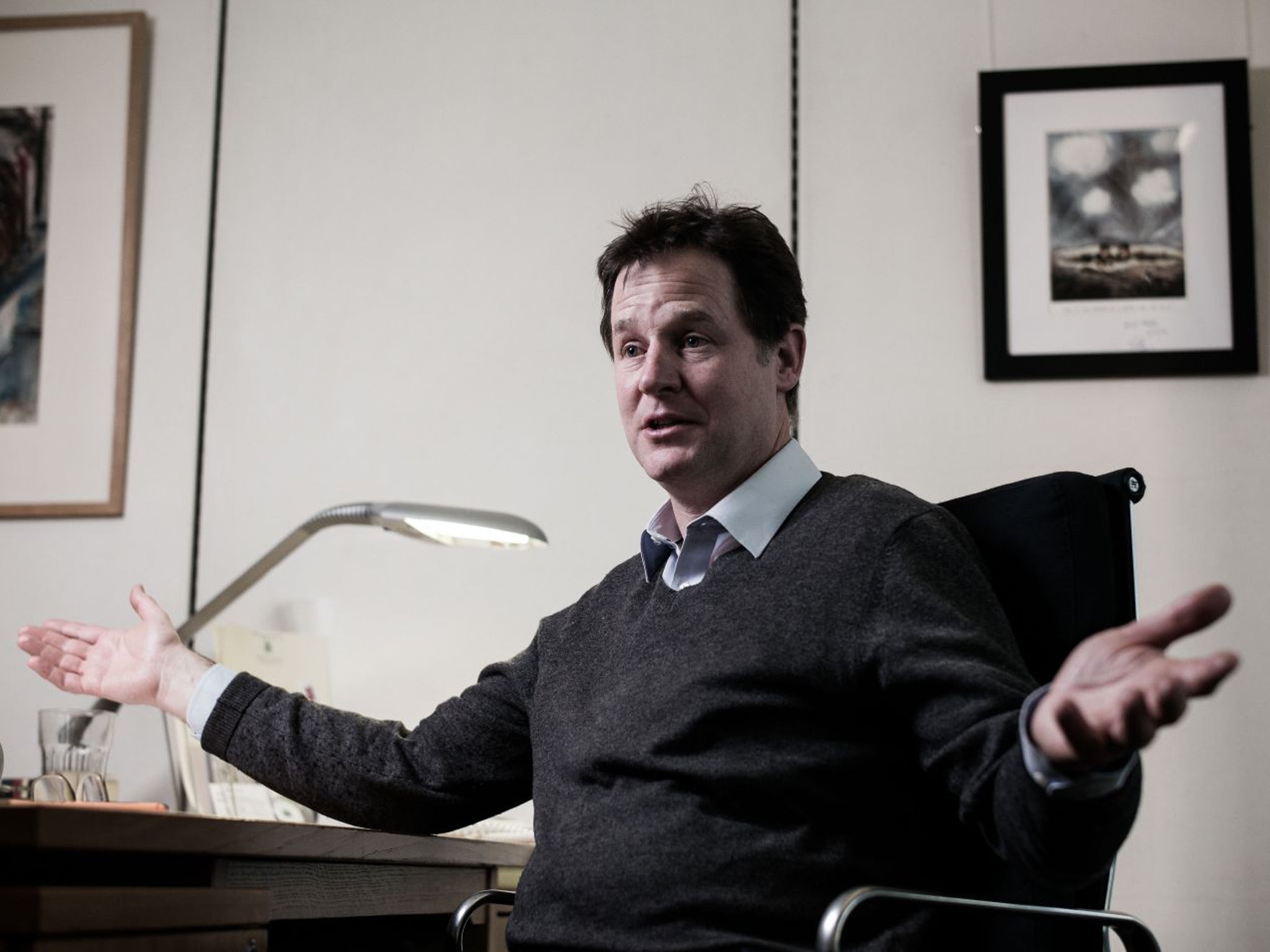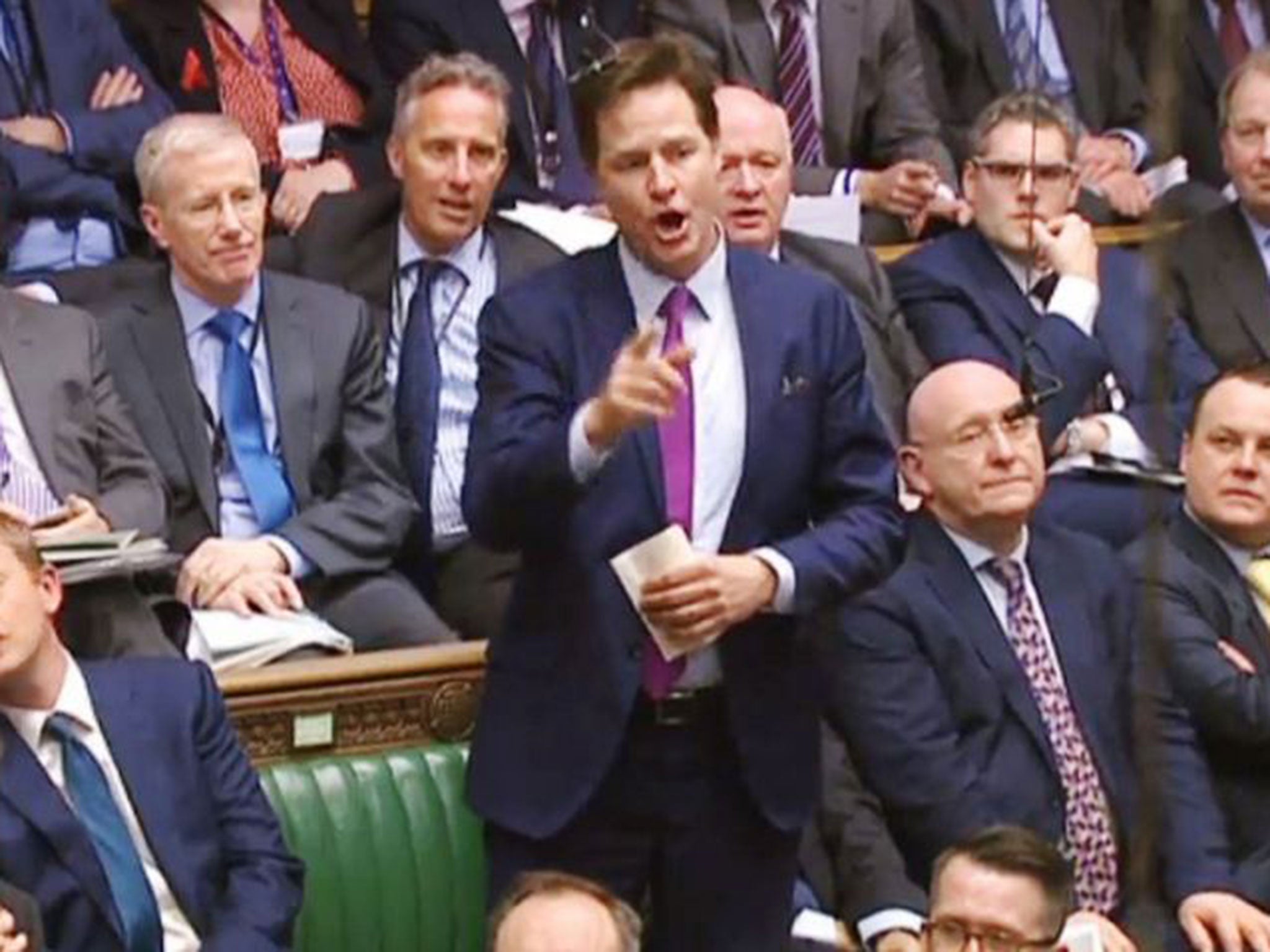Nick Clegg has changed my view of his decision to lead the Lib Dems into coalition with the Tories
For all the overheated language from the left about inequality, the record of the Coalition was surprisingly good


Your support helps us to tell the story
From reproductive rights to climate change to Big Tech, The Independent is on the ground when the story is developing. Whether it's investigating the financials of Elon Musk's pro-Trump PAC or producing our latest documentary, 'The A Word', which shines a light on the American women fighting for reproductive rights, we know how important it is to parse out the facts from the messaging.
At such a critical moment in US history, we need reporters on the ground. Your donation allows us to keep sending journalists to speak to both sides of the story.
The Independent is trusted by Americans across the entire political spectrum. And unlike many other quality news outlets, we choose not to lock Americans out of our reporting and analysis with paywalls. We believe quality journalism should be available to everyone, paid for by those who can afford it.
Your support makes all the difference.Nick Clegg: an apology. I may have given the impression that the Liberal Democrats were a waste of space, and their crushing in the general election was a merited humiliation. Statements such as “Clegg was a fool to have gone into coalition with the Tories” and “the Lib Dems got nothing in return for ministerial posts that David Cameron didn’t want to give them” may have led the reader to believe I thought the whole business a diversion and the resumption of single-party government a welcome simplification.
If so, there has been a misunderstanding. I now realise, reading Clegg’s interview with The Independent’s Andrew Grice last week, that I agree with Nick.
For all the overheated language from the left about inequality, the record of the Coalition was surprisingly good. New figures from the Office for National Statistics last week confirmed that income inequality was unchanged in the 2010-15 period. This is something of an achievement at a time when the Government was cutting public spending, and Clegg is justified in claiming to have tried to balance the books “in the fairest possible way”.
He is right, too, to point out that the spending cuts planned for the next four years are very different, with the burden falling on the poor rather than the rich. I agree when he praises Cameron’s “poetic rhetoric” about an “all-out assault on poverty”, but points out that “the deeply regressive steps taken by his Chancellor, means it is insecure, hollow double-speak”.
It may be that Cameron and Osborne were happy to be liberals with a social conscience in their first term of government. I thought that was mainly from conviction and from a determination to fight for votes in the centre. But I may have misjudged how leaders respond to pressures from inside and outside their parties. Cameron may be a compassionate Conservative who needed the Lib Dems to keep his own party in order.
Since I formed my view of the Lib Dems in the coalition, there have been several instances of a phenomenon that suggests Clegg performed a valuable public service. It is what I call feeding the piranhas. Ed Miliband fed the piranhas. He gave some meat to the most dangerous and destructive elements of his party, and encouraged them to think that there would be more. Once the feeding frenzy got going, the only person willing to put a whole cow in the river was Jeremy Corbyn. The piranhas have got what they wanted and all that’s left of the Labour Party is a skeleton.
Much the same happened to the Republican Party in the US. John McCain and Mitt Romney fed the Tea Partiers and this year the killer fish came for the whole elephant. In Donald Trump they have found a candidate who is most unlikely to become president – a poll last week found 49 per cent of Americans were “terrified” of the prospect – but the piranhas don’t care.

Which is the long way round of saying that I wonder if Boris Johnson hasn’t started something similar in the Conservative Party. Johnson is a compassionate, liberal Conservative, just like his schoolmate Cameron. But like his other schoolmate Ed Miliband – they went to the same Primrose Hill primary school – Johnson has thrown meat in the water. In so doing, he incited the Tory party’s piranhas, whom Cameron had confined in underwater cages on a fish farm for 11 years.
Cameron can probably fend off the predators for the few years he needs to step down with dignity. But can Johnson control the forces he has unleashed? He and Osborne are now competing for the anti-EU votes of Tory Party members. The second most significant event last weekend, after Johnson’s defection to the Outers, was Osborne’s dinner at his Dorneywood country home with Michael Gove – within hours of his defection – and his wife Sarah Vine. The Chancellor is plainly trying to broker an alliance with some of the piranhas.
I doubt that Boris Johnson really wants to head off to the right. He may think that having come out against the EU is enough to give him cover to be centrist on other subjects. But he has said opportunist right-wing things, such as praising secondary moderns (that is, being in favour of selection in state schools), and could find himself swept along by the carnivores.
Just because Labour has vacated the centre ground is no guarantee the Tories will hold it. On the contrary, the right-wing, Eurosceptic grassroot members may be tempted to try to return to a mythical Thatcherism.
Then there would be a huge open space in politics. A space for centrists who want to work with market forces to achieve social justice; for people who want to act on Cameron’s “poetic rhetoric” of attacking the causes of poverty; for people who want to accelerate the public service reforms of the Blair government; for people like, well, Nick Clegg.
Join our commenting forum
Join thought-provoking conversations, follow other Independent readers and see their replies
Comments